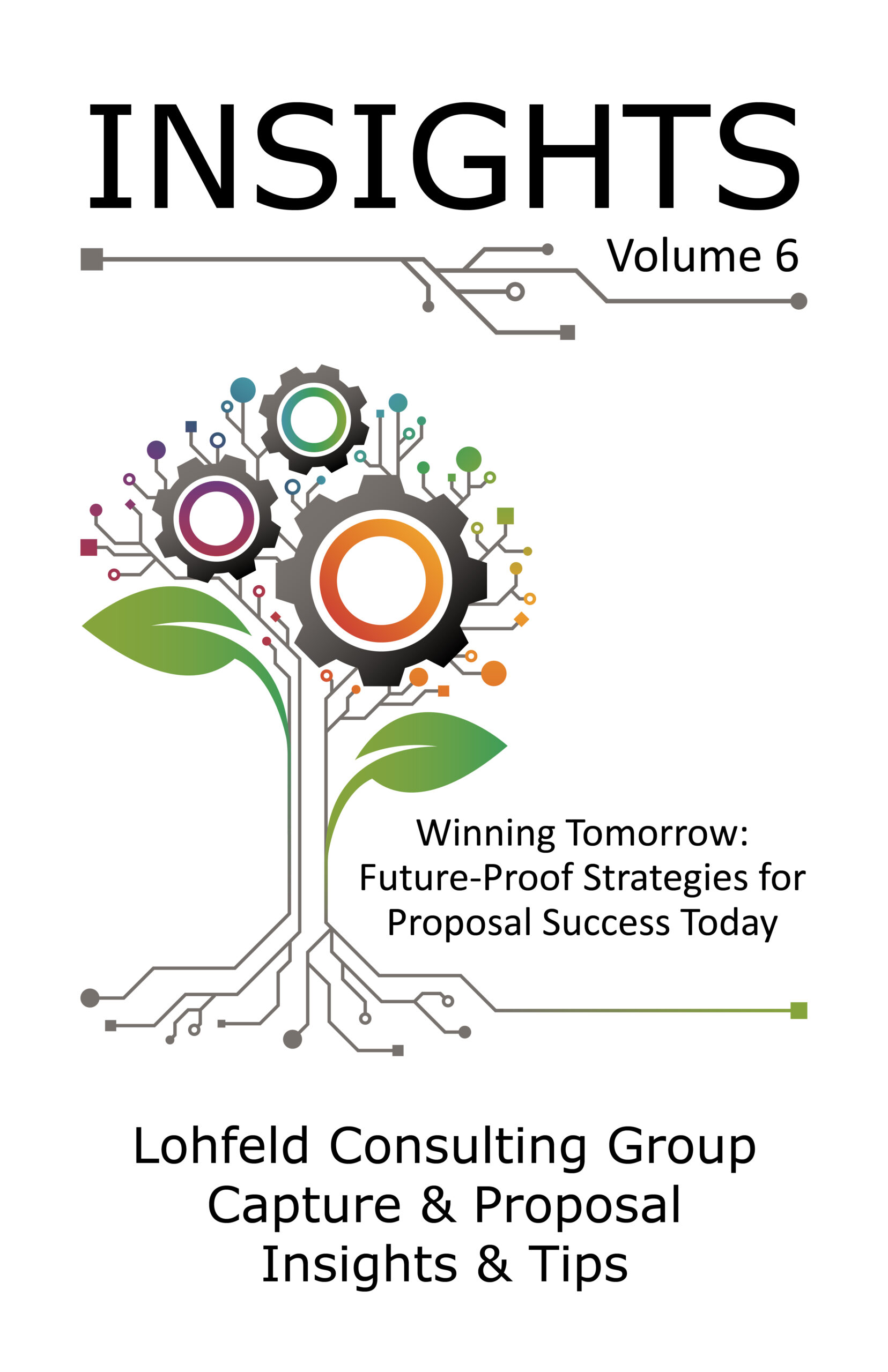Writing the Proposal of the Future – with GenAI (Your Questions Answered)

Artificial Intelligence (AI) is transforming industries, and the bid and proposal industry is no exception. On June 11, 2024, Bruce Feldman, Vice President of AI for Lohfeld Consulting, presented the webinar “Writing the Proposal of the Future – with GenAI” to Deltek GovWin customers. The session was packed with insights and sparked many questions from the audience. Click here to view the presentation.
Below are answers to questions raised by attendees on seven key topics.
Best Practices for Corporate Knowledge Repositories
One of the key topics discussed was the management of corporate knowledge repositories. The emerging best practices for using Generative AI (GenAI) are not just theoretical, but highly practical. They focus on establishing a taxonomy for metadata tagging files. Companies are advised to curate their data by selecting files for the library and ensuring accessibility for GenAI tools. While using connectors or application programming interfaces (APIs) to access data from platforms like SharePoint can streamline this process, the centralization of the curated file set remains crucial.
AI Tools for Small Businesses
For small businesses, the twin concerns of affordability and data security are of utmost importance. AI solutions like Procurement Sciences, which offer domain-aware GenAI platforms, present a cost-effective option with robust security. These platforms charge per seat, making them accessible for smaller teams. On the other hand, tools like AskSage offer a low-cost, self-help model, although they may not match the ease of use and performance of more comprehensive solutions. If you’re interested in a demo of the Procurement Sciences platform, click here.
The Role of AI in Enhancing RFP Quality
One of the key questions raised by participants was whether AI could enhance the quality and consistency of requests for proposals (RFPs). The consensus is optimistic, with many expecting AI to gradually elevate RFP quality. However, it’s important to note that this improvement may not be uniform, as each government agency adopts AI at its own pace and develops its own processes for using AI. Nevertheless, AI’s capacity to streamline and standardize proposal elements could potentially lead to a significant reduction in inconsistencies and an overall enhancement in proposal quality over time.
Comparing ChatGPT-4 to ChatGPT-3.5
The differences between ChatGPT-4 and its predecessor, ChatGPT-3.5, were discussed, particularly regarding business use cases. While ChatGPT-3.5 is accessible for free, ChatGPT-4 offers advanced capabilities like graphics generation and improved writing speed and quality for a small fee. For moderate users who need graphic generation or who write extensively, upgrading to ChatGPT-4 is advisable. The decision hinges on specific needs and the value derived from these enhanced features.
The Future of Free GenAI Graphic Generators
Another intriguing topic was the potential for free GenAI graphic generators. While ChatGPT-4 currently includes a graphics generator, there is speculation that more free options will emerge as companies seek additional revenue streams, such as in-line advertising or user data collection. The evolving landscape suggests that as AI tools become more accessible, their capabilities will expand, offering a greater value without necessarily increasing costs.
Security in GenAI Platforms
Security is a top concern for companies using GenAI. Domain-aware platforms designed for government contracting (GovCon) environments prioritize data protection, effectively creating private data repositories. Public platforms like ChatGPT and Microsoft CoPilot also offer secure versions to safeguard proprietary information. Each company must evaluate whether the security measures meet their CIO’s standards while delivering the desired efficiency improvements.
Performance and Cost of Non-SaaS AI Solutions
A significant topic for participants was comparing SaaS (Software as a Service) and non-SaaS AI platforms. Platforms that don’t require metadata tagging offer high performance at a higher price, with ongoing labor costs for model training. Companies must weigh this trade-off between performance and cost when choosing between a robust solution and more budget-friendly options.
Conclusion
The Lohfeld Consulting webinar highlighted AI’s dynamic and rapidly evolving nature in proposal management. From performance and cost considerations to security and best practices for data management, the insights provided offer a roadmap for professionals navigating this new terrain. As AI advances, staying informed and adaptable will be key to leveraging its full potential in producing high-quality, competitive proposals. By understanding these critical topics, bid and proposal professionals can make informed decisions and ensure they stay ahead in an increasingly AI-driven industry.
Relevant Content from Lohfeld Consulting on YouTube:
- Writing the Proposal of the Future—with Generative AI
- Generative AI for Proposal Development: Insights and Innovations (Part 1 of 2)
- Generative AI is Changing Proposal Development Forever (Part 2 of 2)
- Next-Gen Proposals: The AI-Driven Approach to Winning Bids
- Mastering GenAI for Winning Proposals
By Brenda Crist, Vice President at Lohfeld Consulting Group, MPA, CPP APMP Fellow
Lohfeld Consulting Group has proven results specializing in helping companies create winning captures and proposals. As the premier capture and proposal services consulting firm focused exclusively on government markets, we provide expert assistance to government contractors in Capture Planning and Strategy, Proposal Management and Writing, Capture and Proposal Process and Infrastructure, and Training. In the last 3 years, we’ve supported over 550 proposals winning more than $170B for our clients—including the Top 10 government contractors. Lohfeld Consulting Group is your “go-to” capture and proposal source! Start winning by contacting us at www.lohfeldconsulting.com and join us on LinkedIn, Facebook, and YouTube(TM).
Paperback or Kindle
10 steps to creating high-scoring proposals
by Bob Lohfeld
contributors Edited by Beth Wingate
Subscribe to our free ebrief
Teaming friends, frenemies, and enemies—12 tips to mitigate harmful effects
Did you know that contracting officers spend up to 20% of their time mitigating disputes between teaming partners? In an informal poll we conducted on LinkedIn last month, 40% of respondents classified their teaming partners as “frenemies” on their last bid.
Explore Further
- Advice (542)
- AI (32)
- APMP (18)
- Army MAPS Contracts (4)
- Business Development (302)
- Capture Management (272)
- Complex Technology Grants Services (26)
- Favorite Books (5)
- GenAI (5)
- Go-to-Market (28)
- Graphics (5)
- Lohfeld Books (2)
- NASA SEWP VI Contracts (2)
- Navy SeaPort-NxG Contracts (2)
- NIST MSE Grants (1)
- NIST NAPMP Grants (2)
- Past Performance (63)
- Post-submission Phase (14)
- Pre-RFP Preparation (270)
- Proposal Management (349)
- Proposal Production (81)
- Proposal Reviews (44)
- Proposal Writing (114)
- Pursuit Phase (110)
- Research Report (4)
- Resources (64)
- Tools & Tips (432)
- Training (13)
- Uncategorized (223)

Sign Up for INSIGHTS and Download your FREE book
We'd love to help you with your proposals. Enjoy our complimentary Lohfeld Consulting Group Capture & Proposal Insights & Tips book with your FREE subscription to our Insights Newsletter.
GET YOUR FREE BOOK



